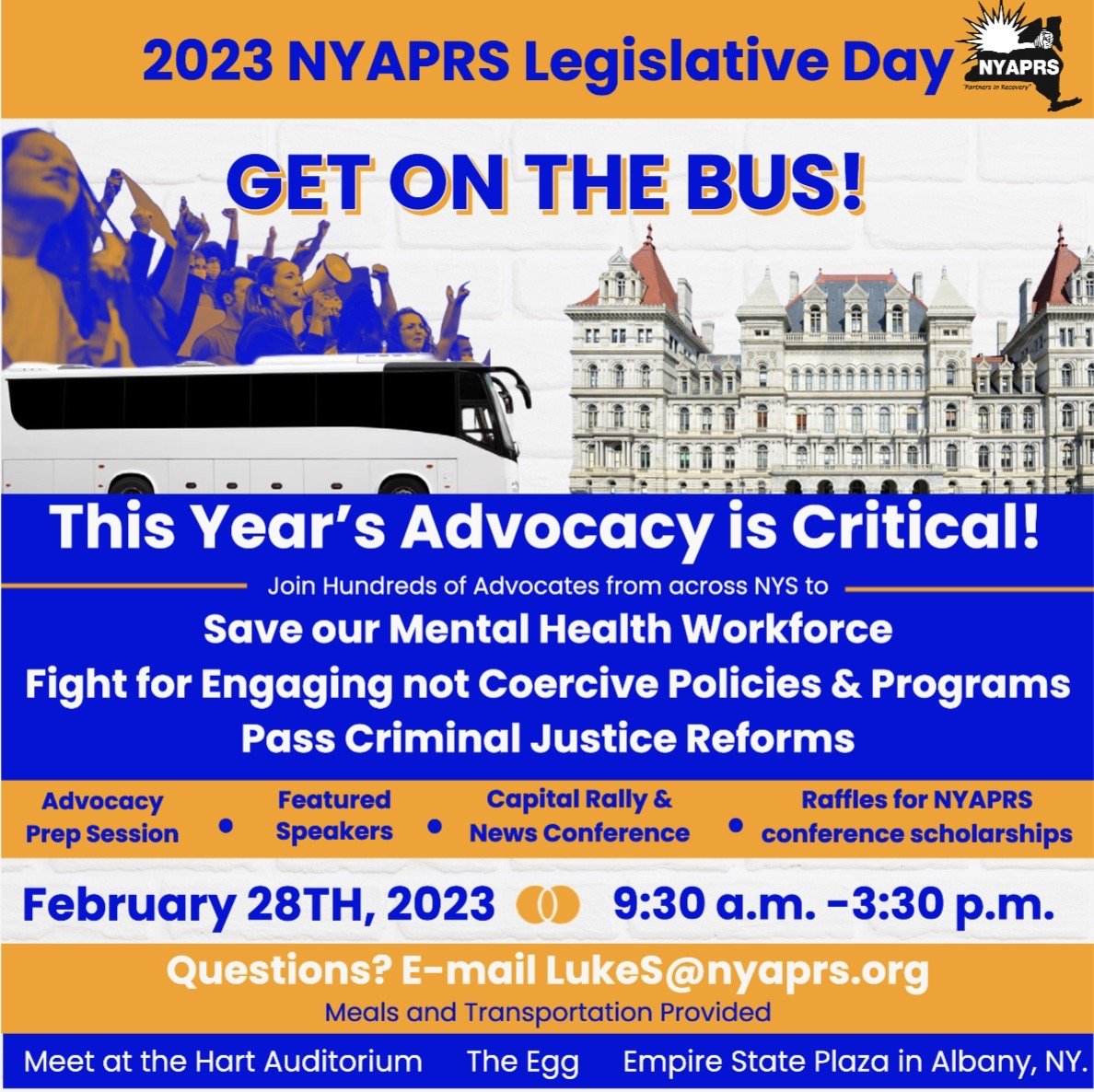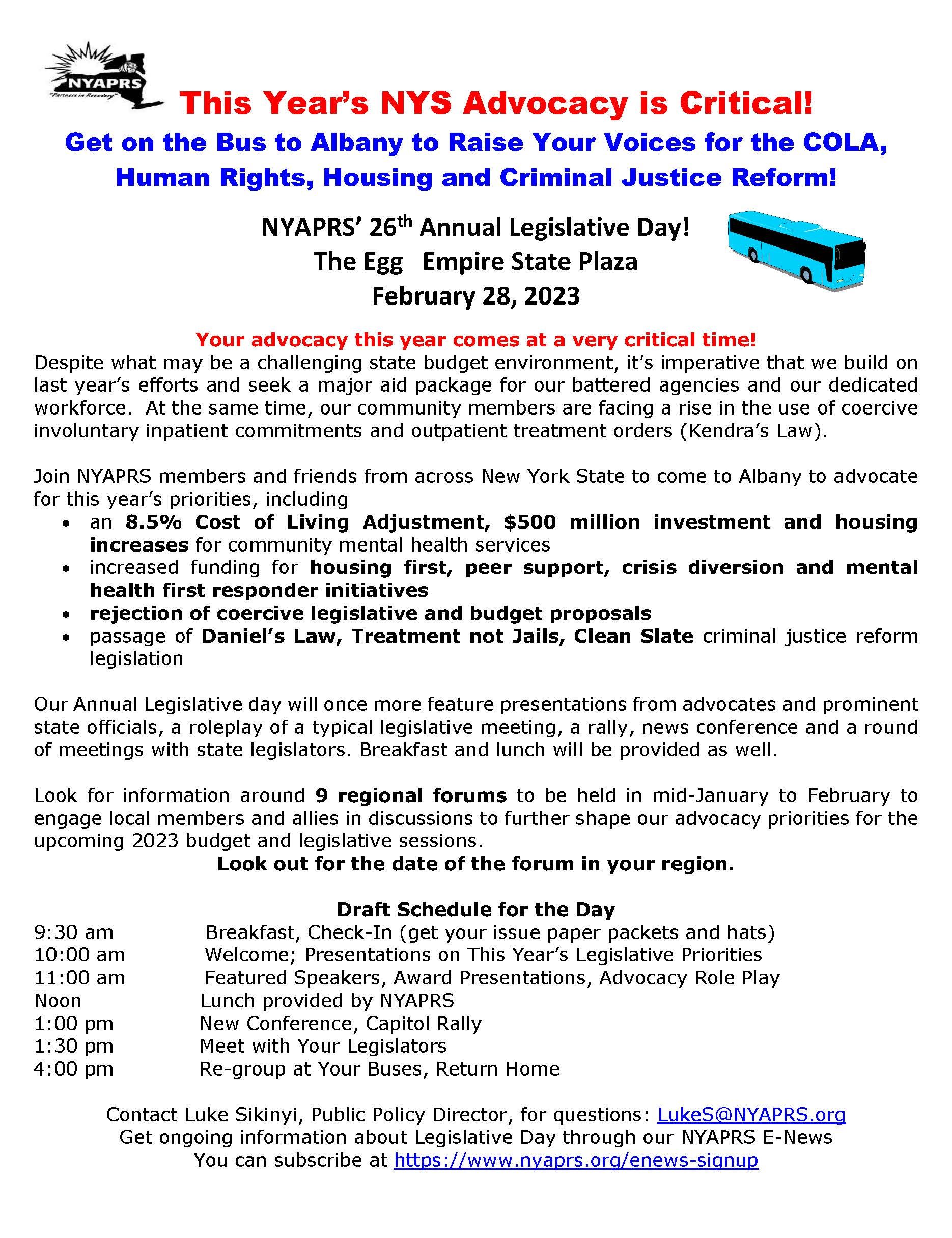NYAPRS Note: Representatives from 12 advocacy groups from across New York will be holding a rally later this morning at New York’s Legislative Office Building urging the Governor and Legislature to work together to provide an 8.5% COLA for our very hard pressed, ever more challenged sector. The COLA will be one of NYAPRS’ top priorities at our upcoming February 28th Legislative Day. See details below.
For Immediate Release
Contact: Leanne Ricchiuti, Overit for Behavioral Health Advocates, 518.222.8073
February 15, 2023
PRESS RELEASE
Behavioral Health Advocates to Rally for Increase in COLA
Various State Advocates to Ask for 8.5% increase in Cost-of -Living Adjustment and $500M to Address Inadequate Rates
(New York, N.Y.) – Twelve advocacy groups across New York State held a rally on Wednesday, at the Legislative Office Building, to call on legislators and the Governor to include an 8.5% increase in the Cost-of-Living Adjustment (COLA), and $500M for rate increases, in the 2023-2024 State Fiscal Year’s budget.
While pleased with Governor Hochul’s overall support of behavioral health, the budget proposal included a 2.5% COLA increase, less than last year’s budget, and advocates say this isn’t
enough. The COLA is not just about staff salaries. It must also address ever increasing costs associated with operating programs and services, such as gas, food, utilities, insurance, etc.
Like all households and businesses across the state and the country, advocates are continuing to do more with less, as current economic conditions have inflated the real costs associated with retaining staff and paying bills. That’s why we are asking for 8.5% COLA plus $500M in rate increases.
“Governor Hochul inherited a mental health housing system that boasts an exceptional mission powered by exceptional staff, BUT that system is struggling because, for so long, it has received inadequate resources,” said Sebrina Barrett, Executive Director of Association for Community Living, an advocate for mental health housing providers across the state. “Housing providers are persevering through many ongoing challenges, such as crippling inflation, sustained workforce shortages, and serving aging residents who are experiencing significant medical concerns—even though their resources to do so are shrinking. The 2.5% COLA included in the executive budget will help, but due to decades of neglect and massive inflation, we need more.”
“Community-based mental health and substance use disorder agencies continue to experience a severe and prolonged workforce crisis that has crippled our ability to meet current demand for services across the state,” said Lauri Cole, Executive Director, NYS Council for Community Behavioral Healthcare. “Staff vacancy rates are in the 30% range right now. This limits access to care. Given the devastation caused by COVID-19 along with a particularly lethal Opioid Epidemic that is not letting up, the Governor’s 2.5% COLA proposal, while appreciated, is NOT sufficient to alleviate this crisis and position us to reduce the deaths of despair that are ravaging our local communities and families. The only way we can make payroll, pay increased rates for food, gas, maintenance, insurance and all of the additional costs associated with operating expenses AND retain valued staff is if lawmakers band together to improve on the Governor’s proposal by including an 8.5% COLA and $500M for rate increases across our systems of care.”
“While Governor Hochul correctly pointed out in her budget address that years of underfunding have hampered mental health and addiction service delivery, her budget proposal falls short of ddressing the consequences of decades of under-funding,” said John Coppola, Executive Director of the New York Association of Alcoholism and Substance Abuse Providers (ASAP). “A flat budget is not the answer. We call on the Senate and Assembly to negotiate an agreement with the Governor to include an 8.5% COLA in this year’s budget to help ensure that vital services are not compromised by the rising costs of providing services. We strongly urge the Senate and Assembly to include in their one-house budget bills a $500 million investment to rebuild a sustainable workforce and service delivery system, so that every New Yorker seeking help is able to access services and supports on demand.”
“An insufficient workforce and organizations that are challenged by significantly increasing costs will not be able to serve the numbers of New Yorkers who are seeking crucial services for mental health or substance use issues,” says Amy Dorin, President & CEO of The Coalition for Behavioral Health. “The 8.5 percent COLA and &500 million must be a priority if the sector is to do what it needs to do to help people and keep our communities resilient.”
“NAMI-NYS is dedicated to caring for those who care for us and we call on New York State to provide the behavioral health workforce with a 8.5% COLA,” Sharon Horton, Executive Director, NAMI-NYS. “As a mother of a son with a serious mental illness, I have seen firsthand the incredile and difficult job the workforce does. I am grateful to these caring workers who have helped my son along the road to recovery.”
“The Supportive Housing Network of New York’s 200 nonprofit member agencies across the State provide homes to over 50,000 New Yorkers,” said Pascale Leone, Executive Director, The Supportive Housing Network of New York. “Our members address the challenges of homelessness associated with disabling conditions to help people live independently, but have received only one state-funded Cost of Living Adjustment (COLA) in over a decade. Inadequate funding for both operating and staff has forced them to pay staff immensely low wages resulting in staffing shortages of up to 50%. These essential workers are bearing the brunt of inflation, and we need to, after years of falling behind, keep pace with rising costs. While a 2.5% COLA is appreciated, 8.5% is what is needed to keep up with the 2022 inflation rate. Staff in supportive housing are predominantly women and people of color, thus their suppressed wages are also a matter of racial and gender inequity.”
“We applaud Governor Hochul for a very impressive budget proposal that addresses so many of MHANYS priorities,” said Glenn Liebman, CEO, Mental Health Association in New York State (MHANYS). “The ability to provide the landmark vision that she has laid out depends on the hard working community mental health staffs and the mental health agencies. We must support our workforce and our community providers by urging the Legislature to support an 8.5% COLA in this year’s budget. This will be integral to the success of this future of New York’s mental health system.”
“The mental health and substance use disorder system’s most valuable asset, our workforce, is in dire crisis,” said Jackie Negri, Director, NYS Care Management Coalition. “And expenses to provide services and supports have increased significantly. Both of these issues must be addressed in this year’s budget to meet the needs of adults, children and families across the state.”
“A society that financially undercuts providers that administer care and healing to those who are fragile, struggling with emotional wellness and/or substance use disorders, is a society that devalues both the employees who do the work and by default devalues the individuals, youth and families who want and need the help,” said Paige Pierce, CEO, Families Together in New York State. “Better, healthier communities start with better resources and this workforce is the lifeline for those resources. Families need a workforce, not waitlists.”
“Recovery is a very challenging process that often relies on the help and hope afforded by a trusted and reliable staff supporter,” said Harvey Rosenthal, CEO of the New York Association of Psychiatric Services. “When the state fails to allow its mental health workforce to stay on the job to keep their commitment to the people they serve, it fails New Yorkers in recovery in very real, human terms.”
“The recent opioid overdose report from the NYS Department of Health shows that New York State saw a 14% increase in overdose deaths involving opioids in 2021 compared to 2020, and New York City experienced a 78 percent increase in overdose deaths since 2019. New York’s opioid death rates exceeded national death rates in both 2020 and 2021. New York needs to approach the opioid and fentanyl crisis with a renewed level of urgency and investment,” said Allegra Schorr, President of the Coalition of Medication-Assisted Treatment Providers and Advocates (COMPA). “Our response must begin by addressing the workforce shortage and the rising costs of operating so that access to medications for opioid use disorder can be maintained and expanded.”
“We all want New York’s children and families to receive the care they need to thrive. In order to create this version of reality, we need to fully fund the system that provides the behavioral health services and supports families rely on,” said Kayleigh Zaloga, President & CEO of the NYS Coalition for Children’s Behavioral Health. “The behavioral health system needs a minimum of an 8.5% COLA just to keep up with last year’s inflation, not to mention overcoming the investment deficit from the preceding decades of underfunding that created an underpaid and overburdened workforce, stretched providers’ budgets to the breaking point, and cut children and families off from critical services. We agree with Governor Hochul that it is time to fix this system, and we simply cannot do that without the resources.”
The twelve agencies represented at the rally are: Association for Community Living, Coalition of Medication-Assisted Treatment Providers and Advocates of New York State (COMPA), Families Together in New York State, Mental Health Association in New York State, National Alliance on Mental Illness New York State (NAMI), New York Association of Alcoholism and Substance Abuse Providers, Inc. (ASAP), New York State Care Management Coalition, New York State Coalition for Children’s Behavioral Health, NYS Council for Community Behavioral Health Care, New York Association of Psychiatric Rehabilitation Services, The Supportive Housing Network of New York, and The Coalition for Behavioral Health.

